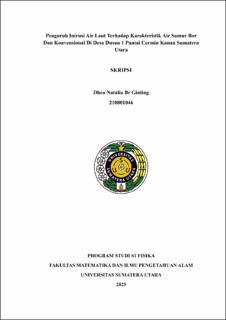| dc.description.abstract | Seawater intrusion is a serious threat to groundwater quality in many coastal areas,
particularly in Indonesia, an archipelagic country that is highly vulnerable to rising
sea levels and excessive groundwater extraction. This study aims to examine the
impact of seawater intrusion on the quality of borehole and conventional well water
in Dusun 1 Pantai Cermin Kanan Village, North Sumatra. Sampling was carried out
at five borehole well points (10–15 m deep), five conventional well points (4–12 m),
and seawater as a comparison. The measured parameters included electrical
conductivity (EC), pH, total dissolved solids (TDS), salinity (Na content), and
manganese (Mn) levels. The results show that borehole well water generally has
better quality with a near-neutral pH (6.58–7.27), low TDS (53–75 mg/L), and
moderate salinity (25–36 g/L). In contrast, conventional well water tends to be more
acidic (6.25–6.62), has higher TDS (74–105 mg/L), and at several points shows a
spike in salinity and very high Mn levels despite being more than 2,000 m from the
coastline. These findings indicate that seawater intrusion significantly affects
shallow, less-protected conventional wells, while deeper borehole wells, although
relatively safer, still show signs of saltwater seepage. This study emphasizes the
importance of regular management of groundwater extraction and improving well
construction standards to control seawater intrusion and protect the health of the
community and the agricultural sector in coastal areas | en_US |


